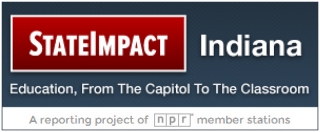
Editor's note: This is the first post of WFYI education reporter Eric Weddle's blog covering analysis, public record requests and tidbits about Indiana education, from K-12 and higher education to state policy.
More than half of Indianapolis Public Schools teachers feel they haven't received enough training on the district's new student behavior plan, according to educators who responded to an optional online survey.
The unscientific survey administered by the IPS teachers union found that 69 percent of secondary teachers and 59 percent of elementary teachers don't feel prepared to carry out the techniques IPS wants staff to use as means of improving classroom behavior and cutting down on out-of-school suspensions.

Only two elementary teachers who responded to the survey ranked their level of support in dealing with student discipline as a 10 out of 10.
"Teachers do not feel supported,” Rhondalyn Cornett, Indianapolis Education Association president, said. "This survey shows that."
Another concern, she said, is that at least 60 percent of teachers who responded don't feel like they understand the district's revised code of student conduct, which deemphasizes the use of suspension for behavior problems.
The mandate to reduce suspensions has lead some teachers to even advocate for educators to leave the district because of safety concerns.
But it's unclear if the sample size truly reflects the district's staff of more than 2,000.
Only 274 teachers responded to the survey held over spring break -- 195 in middle and high school and 79 in elementary. The online survey was emailed to about 1,000 teachers who are members of the IEA in March, Cornett said.
The response of more than 25 percent of union members is proof that there are flaws in how district administrators have rolled out the new policies, Cornett said. A previous survey on teacher pay, she said, drew only a handful of responses from members.
In a statement, Superintedent Lewis Ferebee said the violence and crime ongoing in the city means young people must be taught and coached more than ever. (The full statement is below)
"Changing our discipline practices will not be easy and will take time but it must be done," he said. "More professional development for staff is essential. The stakes are too high to lose more students.
"Those who imply that increasing suspensions is the solution is baffling. We must remember that our schools are an extension of our community and our young people will only replicate what they see from us."
The new behavior policy is technically known as "positive behavioral interventions and supports," or just PBIS, can range from school-wide expectations -- such how students enter the lunchroom each day -- to how a teacher initially responds to rule breakers -- like a student texting in class -- and how the teacher should proceed if the student refuses to listen to a first warning.
The policy also mixes in restorative justice practicies and a program at select schools called Peers Making Peace -- both methods focus on mending rifts between students by group discussions and accepting responsibility.
Here the the survey results:
What level of support do you have for dealing with student discipline in your classroom or school? On scale of 1 (least support) to 10 (most support).
- Elementary: 39.18% (combined responses for 1-3); 42.28% (combined responses for 4-7); 18.13% (combined responses for 8-10)
- Secondary: Elementary: 46.15% (combined responses for 1-3); 35.9 (combined responses for 4-7); 17.95% (combined responses for 8-10)
Do you feel that you have enough information concerning the "new code of conduct"?
- Elementary: Yes, 37.63%; No, 62.37%
- Secondary: Yes, 33.33%; No, 66.67%
Would it be beneficial to build classroom and school culture in the pacing guide at the beginning of the year? If not, what would be helpful to you?
- Elementary: Yes, 57.73%; No, 11.86%; Individual answers made up 30.41% of response
- Secondary: Yes, 46.15%; No, 7.69%; Individual answers made up 46.15% of response
Do you feel that you have enough training on PBIS?
- Elementary: Yes 40.93%; No 59.07%
- Secondary: Yes, 30.77%, No 69.23%
Ferebee's complete statement in response to the survey results:
“Students who miss significant amounts of instructional time fall far behind their peers. Massive and repeated suspensions and expulsions rarely change student behavior.
The IPS Code of Conduct is designed to promote true discipline – to teach. We are implementing proven strategies such as positive discipline approaches and restorative practices without compromising safety and the learning environment.
Given where we are with violence and crime today, we must teach and coach our young people more than ever.
We’ve engaged our local partners in our efforts to transform counterproductive discipline practices. IMPD, Marion County Juvenile court leaders and I were very concerned about the suspensions and expulsions in IPS leading to a pipeline of criminal activity and prison. Mental health is a growing concern that impacts student discipline; and IPS is partnering with Lilly and local health care professionals to tackle this important issue.
Changing our discipline practices will not be easy and will take time but it must be done. More professional development for staff is essential. The stakes are too high to lose more students.
Those who imply that increasing suspensions is the solution is baffling. We must remember that our schools are an extension of our community and our young people will only replicate what they see from us.”
Contact WFYI education reporter Eric Weddle at eweddle@wfyi.org or call (317) 614-0470. Follow on Twitter: @ericweddle.
 DONATE
DONATE







 Support WFYI. We can't do it without you.
Support WFYI. We can't do it without you.